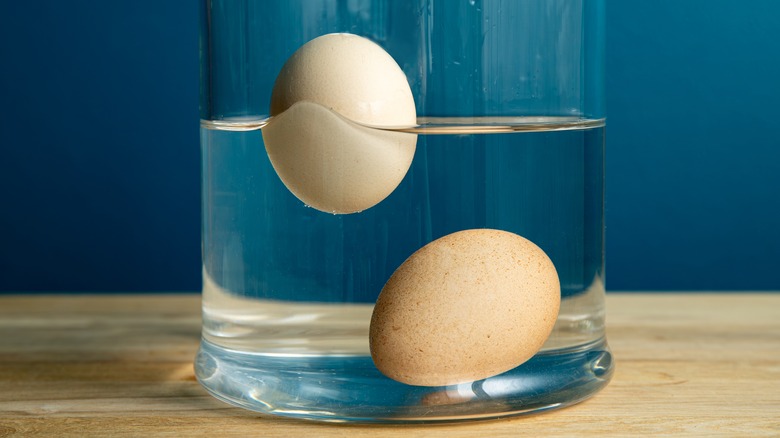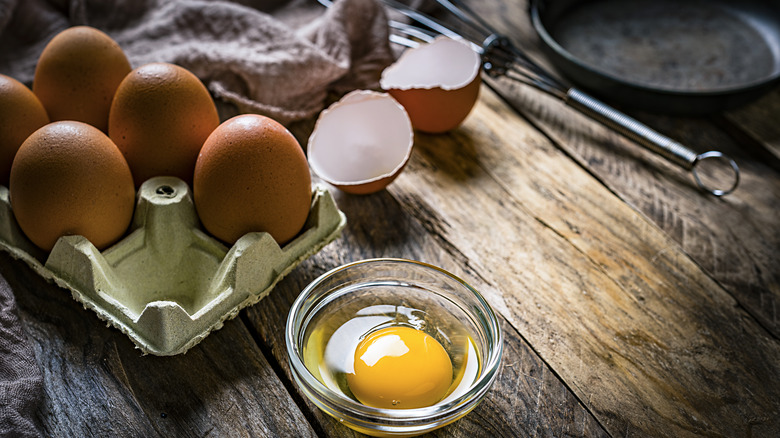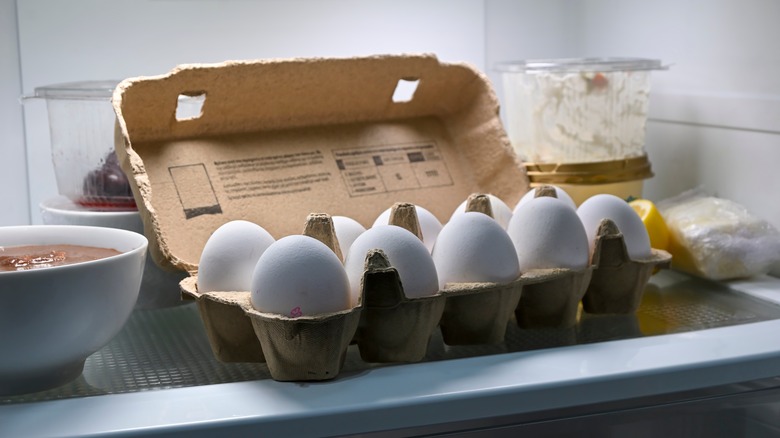What It Really Means When Your Eggs Float In Water
The float test is often touted as a way to check the freshness of eggs before they're cracked open. The process is simple: Fill a bowl or glass with some cold water, then place the egg inside. If it sinks down to the bottom, it's said to be fresh and ready to cook. But if it floats near the top of the water, the test suggests it should be tossed.
However, this test isn't necessarily foolproof. In fact, a floating egg might not be bad at all. Eggs contain an internal air cell that is situated between their inner and outer membranes, and it forms as the egg cools and those membranes shrink. It is true that as eggs get older, the air cell expands due to escaping moisture and gas.
The longer the eggs are stored in the fridge, the bigger that air cell will become, which will make it more likely to float. While there is a chance that the eggs could rot during that storage time, floatation doesn't always necessarily equate to expiration (per the USDA).
How to tell if an egg is bad
If your egg floats, you'll want to do a little more investigation to determine if it's safe to eat. Eating rotten eggs could cause digestive issues, vomiting, or a fever (via WebMD). So before you crack the floater directly into the frying pan, grab a bowl to more closely inspect it.
The first indicator that an egg has gone bad is the smell. Fresh eggs will be totally odorless. Egg whites contain sulfur compounds, which can become unpleasantly pungent over time as the egg degrades. In extreme cases, the foul smell might even be noticeable prior to cracking the egg open.
Color can also play a role in determining an egg's freshness. A fresh egg yolk will appear bright and yellow or orange while a spoiled one may be more muted in color. Rotten egg whites may turn pearly, green, or pinkish, rather than the standard clear or cloudy white.
But that doesn't mean every change in coloration is a reason to toss the eggs, either. Blood spots, for example, are small red spots on the egg's yolk. They're caused by broken blood vessels, but are safe to eat — even if the color might be a little visually off-putting — and not an indication that the egg is bad.
How to keep eggs fresh for longer
If you're planning on stocking up on eggs at the grocery store, there are a few ways you can prolong their lifespan. Firstly, placement is important — so avoid the risky mistake of keeping eggs in the fridge door. Storing eggs towards the back of the fridge will help them stay fresher for longer. This spot keeps them away from outside air when the fridge door is opened, which can cause temperature fluctuations that lead to bacteria growth.
Eggs should also always be kept in the cartons they were purchased in — but store them upside down — this keeps the yolk in the center of the egg, preventing it from rupturing. The cartons can help retain moisture, which could slow the expansion of the egg's air cell. And, they'll create a barrier to keep other fridge smells out, so they won't leech into the eggs.
If you want to cook all your eggs when you're sure they're fresh, you can also hard-boil a batch. Once they've been hard-boiled, eggs will stay good in the fridge for up to a week (in the shell or peeled). So go ahead and use this trick to peel many hard-boiled eggs at once – they can be chopped up to eat in salads, transformed into deviled eggs, or simply eaten whole.



